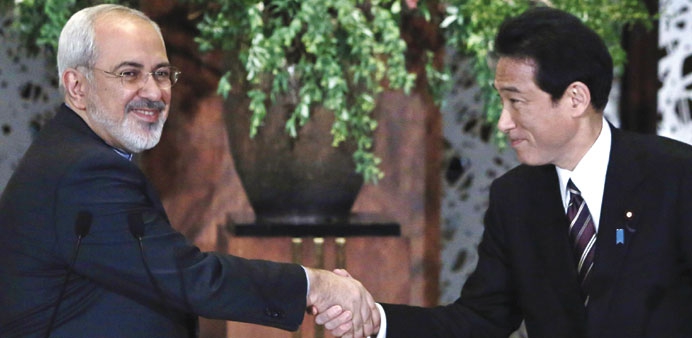 Iran�s Foreign Minister Mohamed Javad Zarif shakes hands with his Japanese counterpart Fumio Kishida�during a joint news conference at the foreign ministry�s Iikura guesthouse in Tokyo yesterday.
Iran�s Foreign Minister Mohamed Javad Zarif shakes hands with his Japanese counterpart Fumio Kishida�during a joint news conference at the foreign ministry�s Iikura guesthouse in Tokyo yesterday.Iran is pinning its hopes on the success of talks with the West about its nuclear programme but insisted it would not scrap a controversial reactor, its foreign minister said yesterday.
Mohamed Javad Zarif made the comments as he ended an official visit to Tokyo which included talks with his Japanese counterpart Fumio Kishida and Prime Minister Shinzo Abe.
Zarif said Iran would not shutter the unfinished Arak heavy water reactor, a concern to the West because Tehran could extract weapons-grade plutonium from its spent fuel if it also builds a reprocessing facility.
This would give it a second route to a nuclear bomb.
Zarif said Arak was crucial for peaceful scientific pursuits, and insisted that �we are not going to close it.�
�We have based all of our calculations on the success of these negotiations� with Western powers, Zarif told reporters in Tokyo.
�I think that�s a better option, for the negotiations to succeed. It�s a better option for everybody.�
Under a November interim deal, Iran agreed to roll back or freeze some nuclear activities for six months in exchange for modest sanctions relief and a promise by Western powers not to impose new restrictions on its hard-hit economy.
Negotiators hope to reach a final accord by July 20 when the interim agreement, which came into effect in January, is due to expire.
The West and Israel have long suspected Iran is pursuing a nuclear weapons capability alongside its civilian programme, something Tehran denies.
�We believe the solution is at hand,� he told a joint press conference with Kishida later. �I am sure if the other side comes with the same posture we will have a satisfactory conclusion within a short period of time.�
He praised Japan�s expertise in the nuclear field and said more investment in Iran�s atomic sector could serve as �a mutual confidence-building operation.�
�Japan can also be on the ground in Iran and see for itself that Iran�s programme is nothing but peaceful,� he added.
Zarif said that despite the problem at Fukushima, when a tsunami sent three reactors into meltdown and provoked a mass evacuation, Iran still had faith in Japan�s nuclear know-how.
�Japan has been able to address that disaster,� he said.
Japan has been reducing Iranian oil imports despite energy shortfalls in the wake of the tsunami and nuclear incident three years ago, which forced Tokyo to turn to pricey fossil-fuel options to plug the energy gap.
Kishida said he had promised Tokyo�s help in trying to broker a deal between Tehran and world powers.
�I told the foreign minister that Japan, along with the international community, will actively engage in the process towards the final agreement,� he told reporters.
�The comprehensive solution to Iran�s nuclear issue is extremely important, not only for the Middle East, but also for the peace and stability of the world.�
In Vienna Western powers pressed Iran to tackle suspicions that it may have worked on designing an atomic bomb and the US said the issue would be central to the success of talks with Tehran.
At a board meeting of the International Atomic Energy Agency, Washington and the European Union underlined their support for the UN watchdog�s efforts to investigate long-running allegations of possible nuclear arms research by Iran.
The US ambassador to the IAEA, Joseph Macmanus, said it remained critical for Iran to address substantively all international concerns about the so-called possible military dimensions (PMD) of the country�s nuclear programme.
A �satisfactory resolution of PMD issues will be critical to any long-term comprehensive solution to the Iranian nuclear issue,� Macmanus said.
He later told reporters: �It is a central element to this negotiation, and all parties recognise that.
By Gulf Times
The Iran Project is not responsible for the content of quoted articles.











